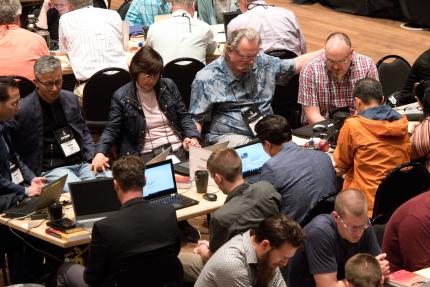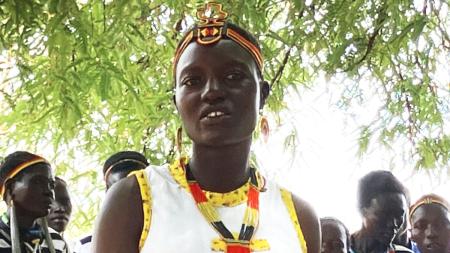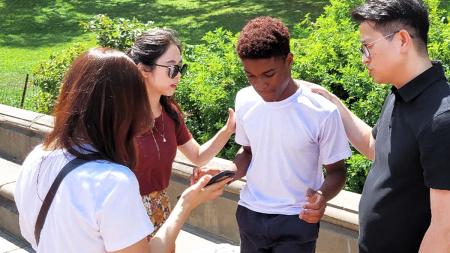Changes Coming for Future Synods

Prayer and worship will become a more intentional feature of future synod’s work sessions.
Karen Huttenga
Synod 2019 adopted several recommendations from a Synodical Review Taskforce to improve future synods. This included fine-tuning the rules for the format, function and even the length of future synods. They did not, however, accept recommendations that would set parameters about who classes could send to synod on their behalf.
At future synods, delegate speeches will be limited to three minutes. The CRC will offer more extensive training for delegates and will design synods to include more discussion around themes.
But Synod declined to adopt several key changes that its own Synod Review Task Force had recommended. Delegates cited concerns that those changes would have given the denomination too much control over local groups of churches (classes).
The task force wanted to require classes to send at least one woman or ethnic minority delegate to synod. Synod chose instead to recommend the inclusion of a female or ethnic minority delegate from each classis.
“It is inappropriate to require what may not be possible for some classes to provide,” said Lora Copley, Classis Red Mesa. “To use the word ‘require’ would damage the very thing that we have called for, that we would serve one another and honor and respect our differences,” referring to the two differing perspectives held by the CRC on having women serve as synod delegates, both of which have been accepted in the denomination. Many delegates voiced similar sentiments.
Others argued, however, that the denomination has been recommending ethnic minority inclusion at synod for more than two decades, but still hasn’t made significant progress. “Passing this motion tonight will make us think we’ve done something when we haven’t,” said Meg Jenista Kuykendall, Classis Hackensack.
Synod also turned down a proposal to require classes to pay a delegate registration fee that would help cover synod travel costs.
“This is not a money grab,” said William Koopmans, speaking for the task force. “We believe that this would give us a form of accountability, a reality check … . If we come to synod then we ought to contribute.”
But some delegates weren’t so sure. “My classis would have to limit its local ministries in order to fund this,” said Chad Vandervalk, Classis B.C. South-East.
The task force recommended each synod select the officers (president, vice president, etc.) to serve at the next year’s synod. That way, the officers could receive more training and also attend Council of Delegates meetings during the year.
“It’s a scary thing to be elected an officer to synod,” said task force chair and Synod 2019 vice president Thea Leunk. “With this recommendation, we will see different faces at this table, and that’s a good thing for this denomination.”
Once again, many delegates considered the proposal an overreach. “Let’s keep our parliamentarian approach and see how we do, because I don’t think we’re doing so badly right now,” said Gerald Koning, Classis Georgetown.
In the end, Synod 2019 at least addressed what task force chair Thea Leunk said was the “No. 1 complaint about synod”—it agreed to limit speeches to three minutes.
Some argued that the chair has the job of cutting off long-winded speakers, but Koopmans countered, “The chair doesn’t want to be the hard-nosed person that is always cutting people off. This is a way of enabling the body, to hear more from more people.”
Here are the other recommendations that were adopted by Synod 2019 for future synods:
- a volunteer on-site mentor/guide to synodical procedures for young adult representatives and ethnic minority persons
- orientation for all (not just first-time) delegates and advisers prior to the convening session of synod
- firm adjournment time (possible deferment of unfinished items on the agenda to the following synod or to the Council of Delegates)
- prayer would be central to worship and become a more intentional feature of synod’s work sessions
- no more than two major study reports will be on the agenda in a given year
- executive session decisions should include a recommendation regarding what is to be included in the public record
- new rules about what kind of amendments are allowed; when and which kinds of motions are up for debate before a vote, how the chair is challenged, and so on (good thing there will be orientation for all to review these kinds of procedures!)
- a basic review of the Rules for Synodical Procedure will be included in the training of officers
- a definition and descriptions of synod will be added to the Rules for Synodical Procedure
- intentional opportunities for purposeful dialogue (seven different considerations for this)
- improved connection between synod and classes and churches (five different methods listed)
- a parliamentarian appointed each year by the program committee to help synod follow the rules synod has set out
- more extensive training for all delegates prior to synod with online and printed materials that cover rules and best practices (plus on-site engagement with training materials led by trained educators before synod begins)
- training of advisory committee chairs and reporters (points to include synodical rules, best practices for leading committees, developing reports, and more)
- guidelines to avoid inappropriate use of social media contact with nondelegates during advisory committee meetings and plenary sessions as part of delegate training
- a scheduled rotation of synod locations: Synod will follow a cycle of three annual synods in Grand Rapids (one of those could be at a nearby midwest location such as Chicago) followed by a fourth-year meeting in a different North American location where CRC congregations are clustered. (The Task Force had wanted synod to include a note about additional costs for the fourth-year meeting to be drawn from classes without financial hardship, but synod said no.)
- “themed agendas” and/or “themed synods” could be recommended periodically by the Council of Delegates
- training and orientation for delegates to better understand the power with which they are privileged, especially with regard to gender, ethnicity, position, and age (this will be biblically and theologically grounded such as what is articulated in “God’s Diverse and Unified Family”)
- speeches must be no longer than three minutes per person during plenary deliberation (exceptions are possible for someone for whom English is a second language or who may require interpretation services)
- classes are encouraged to develop/maintain policies through which the classis would provide remuneration to delegates who are financially disadvantaged through service to synod.
- classes are encouraged to send one or more delegates to synod for two consecutive years, if possible, to build continuity from synod to synod.
- each classis is encouraged to include at least one woman or one ethnic minority person in its delegation of one minister, one elder, one deacon, and one other officebearer to synod.
For continuous coverage of Synod 2019 including the live webcast, news, video recordings, photos, liveblog, social media links, and more visit www.crcna.org/synod.


